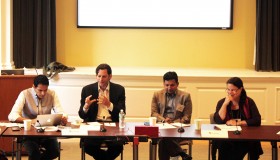
Network map of health data flow from paper records to consolidated databases, from the sub-center level upwards.
In September 2016, the Harvard South Asia Institute, with support from the Radcliffe Institute of Advanced Studies, organized the two day seminar, Exchanging Health Information: Setting an Interdisciplinary Research Agenda. A new report contains a summary of the seminar deliberations and a roadmap for prioritizing research and policy formulation for health information exchange in India.
The seminar brought together experts in medicine, computer science, data science, public policy and law to identify a research and policy agenda that addresses implementation barriers to health information exchange. Building on international standards in health systems interoperability and learning from best practices from other industries, seminar exercises employed India as a use-case to anchor deliberations.
SAI recently spoke with seminar organizer Satchit Balsari, Fellow at Harvard FXB Center for Health and Human Rights and Chief at Weill Cornell Global Emergency Medicine Division, about the seminar and its potential impact.
SAI: Why was it important to bring together an interdisciplinary event, with experts from a variety of fields, to address implementation barriers to health information exchange?
Satchit Balsari: We have observed in many sectors that new technology best succeeds when it is in tune with user behavior and regulatory frameworks. When all three are in sync, we see widespread adoption. Problems come up when one of is out of step. The high level of provider dissatisfaction with some of the larger electronic medical records in the US, for example, is largely because front-line clinicians have had little input or control over the design and implementation of these EMRs. Standardization and interoperability to allow patients to move their records from provider to provider, or across institutions required legislation and incentivization. Retro-fitting has been expensive. Yet patients and doctors will tell you how incredibly important it is for health data to be more portable than they have typically been. Legitimate concern for data privacy thwarted portability in early years, when there may have always been technical solutions to legal concerns. Bringing together a wide range of stakeholders from clinical practice, law, policy-making and computer science allowed folks to understand the needs and limitations of each discipline, while formulating an inter-disciplinary approach to health information exchange in emerging economies.
SAI: In what way does India provide a valuable case study for looking at how health information is exchanged?
SB: India is a greenfield for electronic health information. With the exception of a few large private tertiary hospitals, most clinical data is recorded on paper, if at all. India is in the process of writing its health information law and about to launch a regulatory body, the National Digital Health Authority. India is therefore uniquely poised to learn from the challenges we have faced in the US and hard-wire in technical solutions or regulatory frameworks that will allow the medical profession to take advantage of all that a digital health information ecosystem can offer. Seminar deliberations leaned toward an API-driven distributed architecture, where large amounts of sensitive patient data do not need to be consolidated or stored in central repositories. Participants also explored the feasibility of creating patient-based health records that draw data from various actors including pharmacists, labs, private practitioners, and hospitals. Again, India’s near universal unique identity verification system, Aadhar, would allow the tagging of all transactions to a single unique identifier. Going back to your earlier question, it is imperative that such solutions — especially in a population with limited literacy — are therefore created in tandem with regulations that adequately address concerns about data privacy, breaches and abuse, while fostering advances in clinical data exchange, research and policy making.
SAI: What practical impacts do you hope this research will have?
We are working with partners in India, in both the public and private sector, to prototype some of the designs proposed by the seminar participants. We are particularly interested in testing the adequacy of current (and proposed) laws while testing the various digital health ecosystem models being recommended there.
Click here to view the report.

